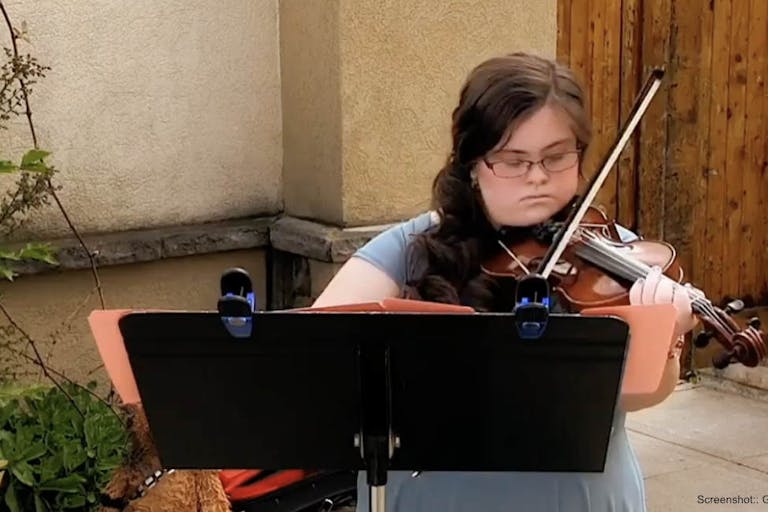
Christian college allows pro-life club after resolving 'misunderstanding'
Bridget Sielicki
·
Family says teen with Down syndrome was intentionally killed by hospital staff
A Wisconsin family has announced plans to sue an Appleton hospital, claiming their 19-year-old daughter with Down syndrome was intentionally killed.
In 2021, Grace Schara died at St. Elizabeth’s Hospital. In a Facebook post, the Schara family said Grace had been given a do-not-resuscitate (DNR) order without their knowledge or consent. Additionally, they said Grace had been given a cocktail of drugs — Precedex, Lorazepam, and Morphine — which are known to cause hypoxia, or low levels of oxygen in body tissues.
“As Grace slipped into acute respiratory failure and Grace’s sister begged for help, instead of starting CPR immediately, the nurses refused; Grace’s physician had independently designated her as a ‘Do Not Resuscitate’ (DNR),” the family’s statement said. “That DNR order was written without the family’s consent and in defiance of the Schara family’s express wishes that all lifesaving measures be deployed for their Down [s]yndrome daughter.”
The family has filed paperwork with the state of Wisconsin to begin the lawsuit process.
“St. Elizabeth’s not only breached the Standard of Care, but their unethical behavior led directly to Grace’s death,” Scott Schara, Grace’s father, said. “It’s clear to me that this hospital was a dangerous place for Down [s]yndrome patients like my daughter. My Grace was discriminated against due to her disability and she received grossly subpar healthcare, in clear violation of the Americans with Disabilities Act.”
In a website set up to keep the public informed about the court case, the family spoke lovingly of their life with Grace. They say she referred to her third copy of the 21st chromosome as her “love chromosome,” and say that Grace’s Down syndrome didn’t stop her from doing anything.
Both Grace and her mother caught COVID-19 during the pandemic, and though she was doing well, the family had been monitoring her oxygen levels out of excess caution. When they dropped below 90, they took her to the emergency room, where it was recommended that she be admitted into the hospital.
“We never would have considered that this would be a dangerous place to put her in,” Schara said. He added that doctors tried to place Grace on a ventilator, citing results from a blood gas draw, but he asked them to run the test again; when they did, it came back within normal levels. Then, he said hospital staff began pressuring them to give a preauthorization to ventilate Grace if they felt it necessary; the family refused.
By the fourth day of Grace’s hospitalization, Schara said the head nurse came in with an armed guard and told him he was not allowed to remain in her room anymore.
“Obviously, because I was challenging the protocols I was seeing,” he said. “So I called an attorney friend, and he said, ‘Scott, just leave peacefully.’ And I gave Grace a hug… you know, I could just see in her eyes she was sad. That’s the last time I saw her.”
Article continues below
Dear Reader,
Have you ever wanted to share the miracle of human development with little ones? Live Action is proud to present the "Baby Olivia" board book, which presents the content of Live Action's "Baby Olivia" fetal development video in a fun, new format. It's perfect for helping little minds understand the complex and beautiful process of human development in the womb.
Receive our brand new Baby Olivia board book when you give a one-time gift of $30 or more (or begin a new monthly gift of $15 or more).
Grace’s mother, Cindy, was not allowed to be with her daughter as a replacement advocate because she had COVID-19 as well, so Grace was left alone in the hospital for 44 hours. Under the Americans with Disabilities Act (ADA), Grace had the right to an advocate, so they tried to get Grace’s sister, Jessica Vander Heiden, approved as a replacement advocate.
Still, there was allegedly poor communication.
“No doctor or nurse came to me and said anything they were doing,” Vander Heiden said. “I had to overhear what they were saying. They were just making decisions on their own, without even communicating with Grace’s power-of-attorney, which was my mother.”
One of the drugs they administered to Grace, Precedex, is not meant to be given for longer than 24 hours; they had given her the maximum dose to Grace for four days. Then, in her last day in the hospital, they added lorazepam and morphine, which Schara said is known to cause death.
“They gave Grace a combination of drugs that none of us could have survived,” he said.
Meanwhile, Vander Heiden noticed that Grace’s hands were growing cold, but nurses shrugged off her concerns. Eventually, she realized she couldn’t find a pulse, and her eyes were rolling back in her head. She begged the nurses to come help, but they refused; when the Scharas told them to help, they responded that Grace was DNR.
Vander Heiden said she stood by helplessly as dozens of nurses stood by and did nothing as Grace slowly died.
“We not only hope that justice will come for Grace but, also, for the hundreds of thousands of lives stolen by this medical tyranny,” Vander Heiden said at a press conference. “These crimes against humanity must stop. They need to be held accountable for their actions.
Live Action News is pro-life news and commentary from a pro-life perspective.
Contact editor@liveaction.org for questions, corrections, or if you are seeking permission to reprint any Live Action News content.
Guest Articles: To submit a guest article to Live Action News, email editor@liveaction.org with an attached Word document of 800-1000 words. Please also attach any photos relevant to your submission if applicable. If your submission is accepted for publication, you will be notified within three weeks. Guest articles are not compensated (see our Open License Agreement). Thank you for your interest in Live Action News!

Bridget Sielicki
·
Analysis
Angeline Tan
·
Analysis
Cassy Cooke
·
Politics
Madison Evans
·
Opinion
Nancy Flanders
·
Investigative
Carole Novielli
·
Analysis
Cassy Cooke
·
International
Cassy Cooke
·
International
Cassy Cooke
·
Politics
Cassy Cooke
·
Pop Culture
Cassy Cooke
·